Thomas James Richards, Diaries, Transcript Vol. 3, 26 January to 8 November 1916 - Part 6
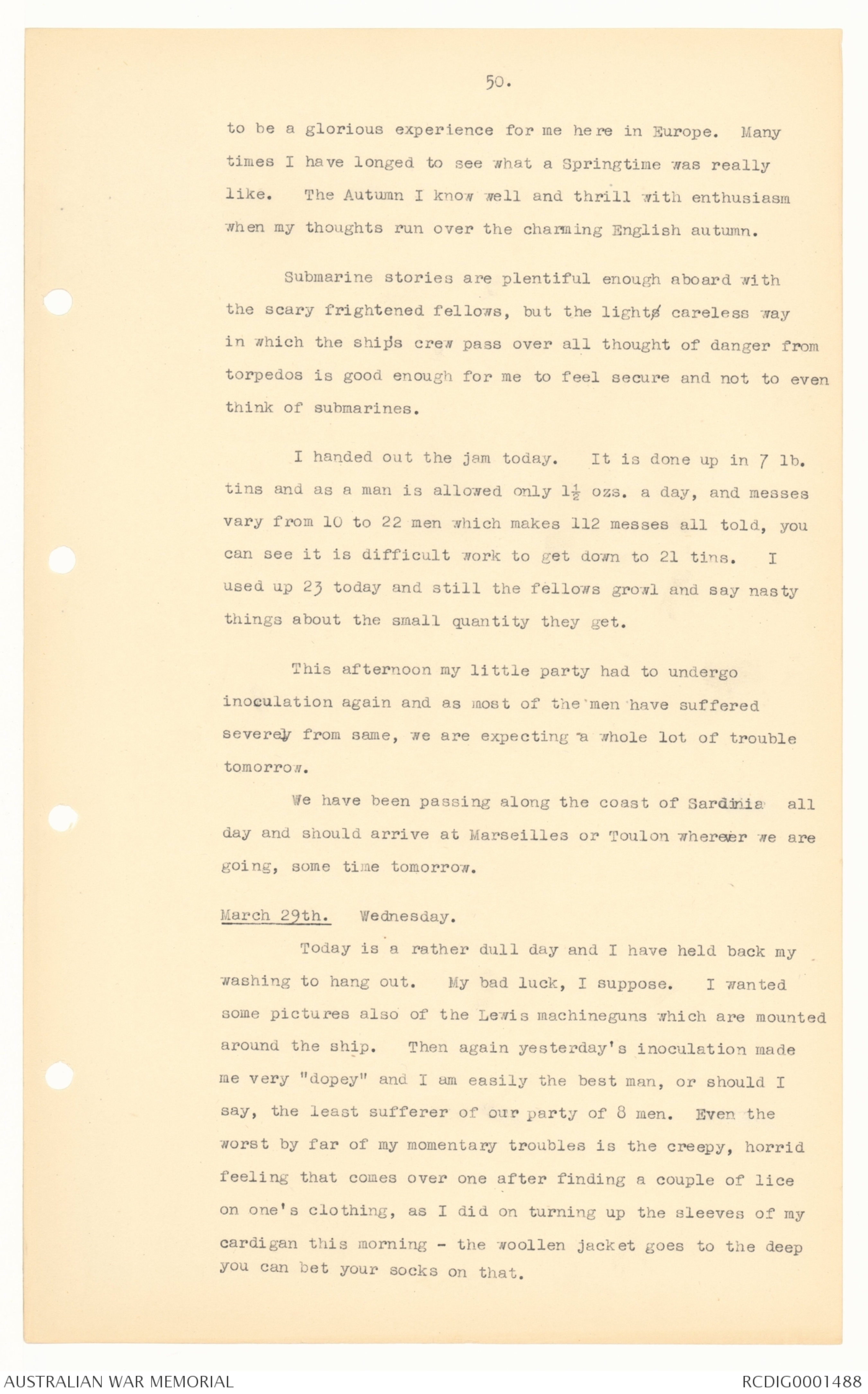
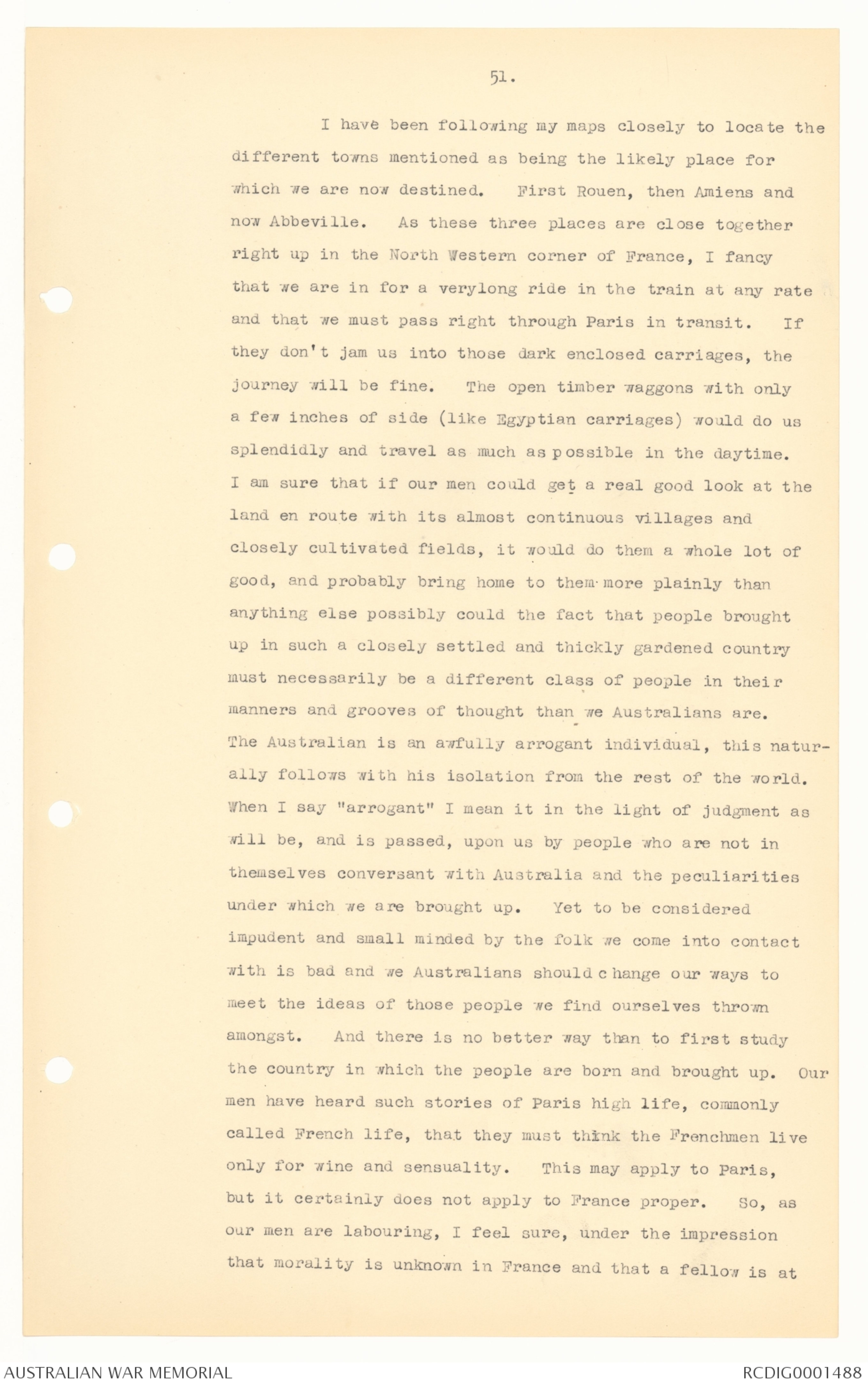
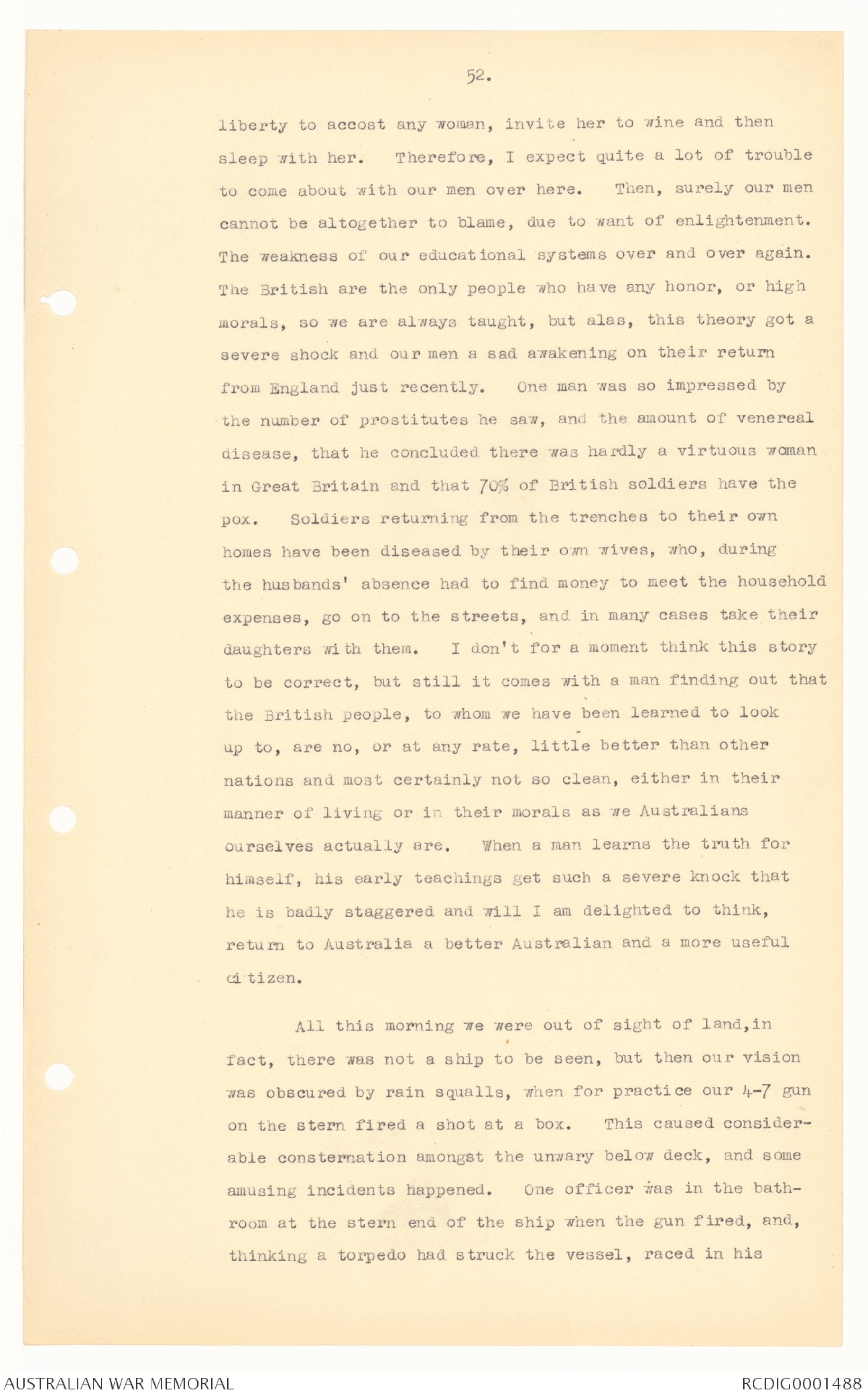
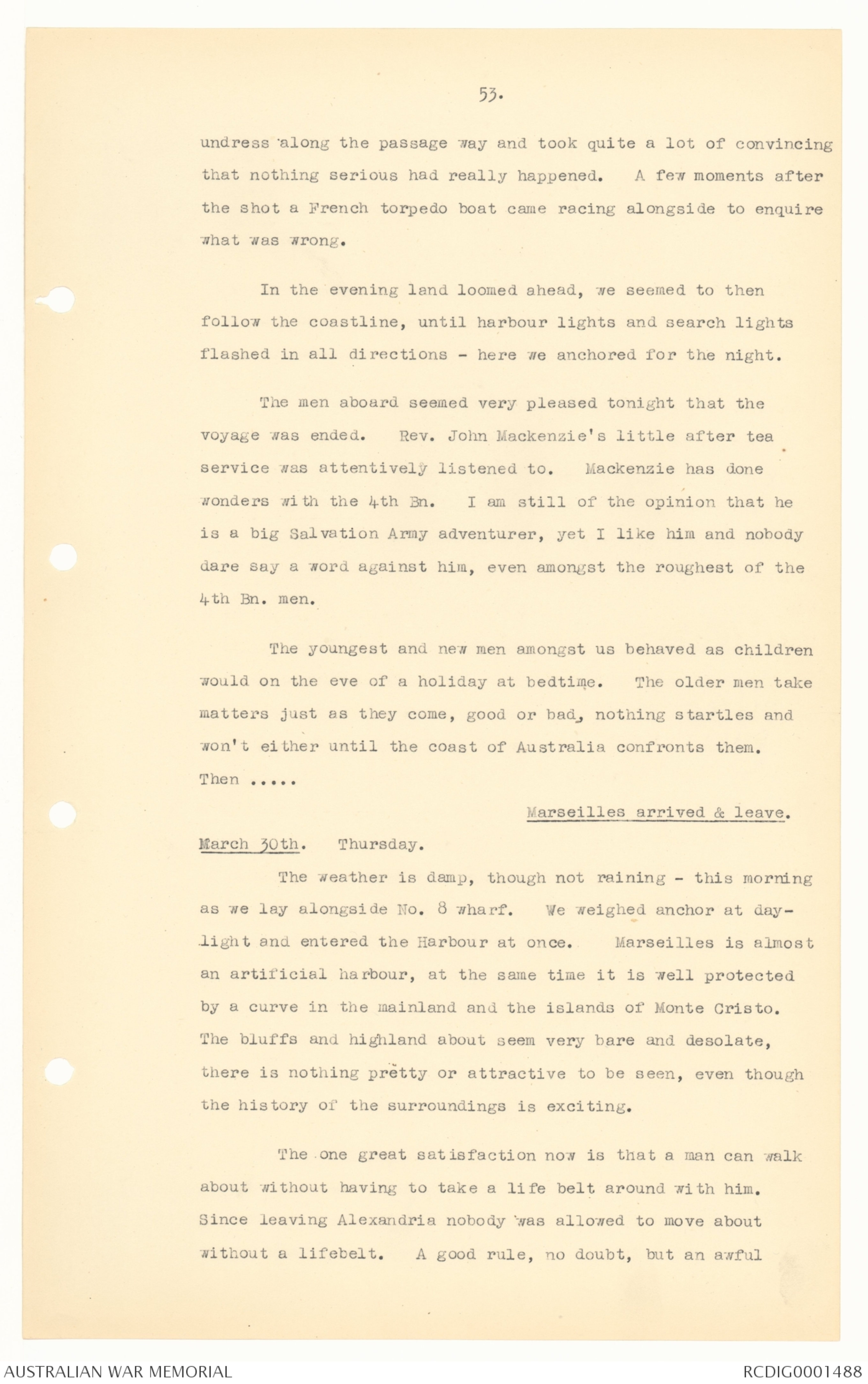
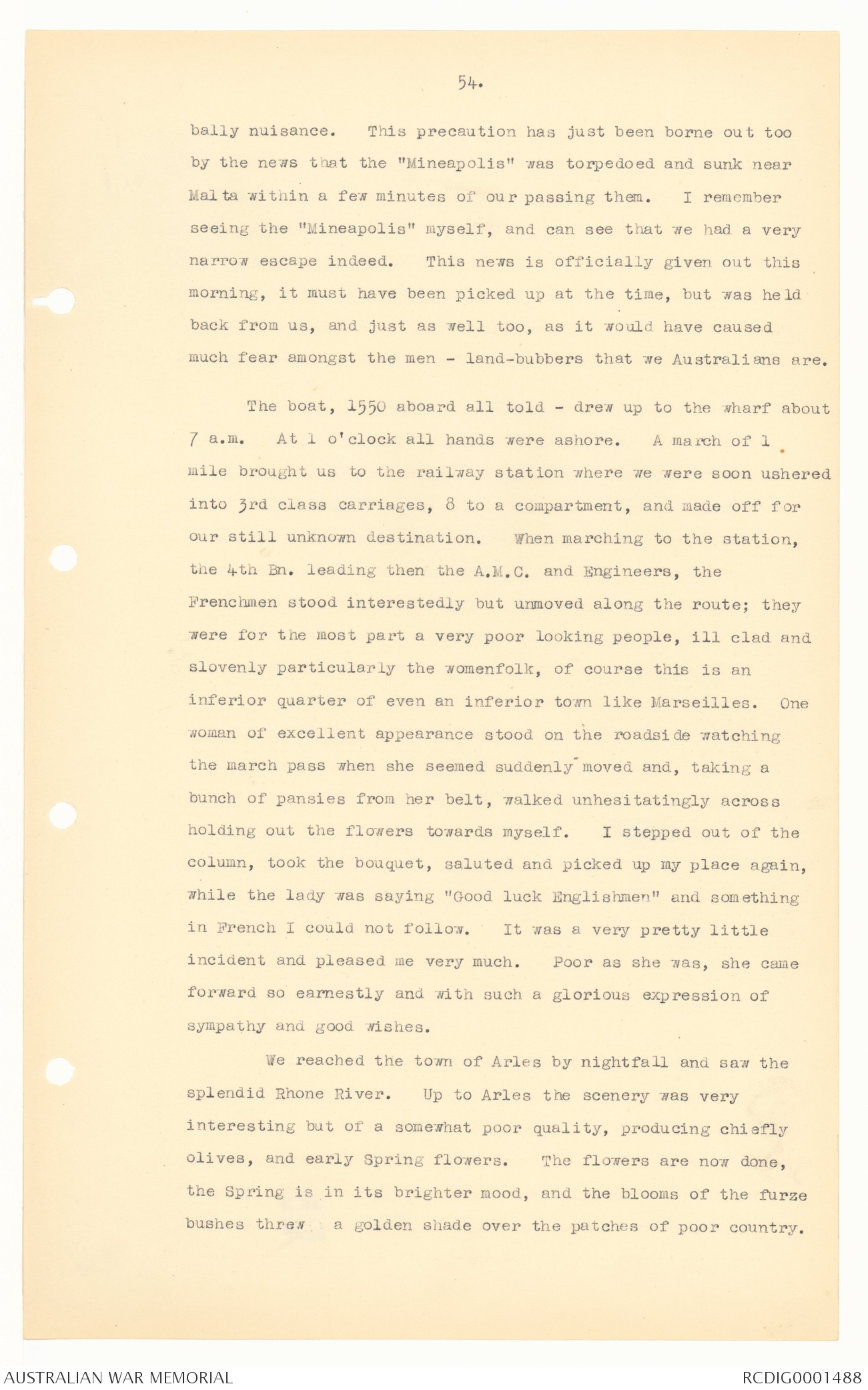
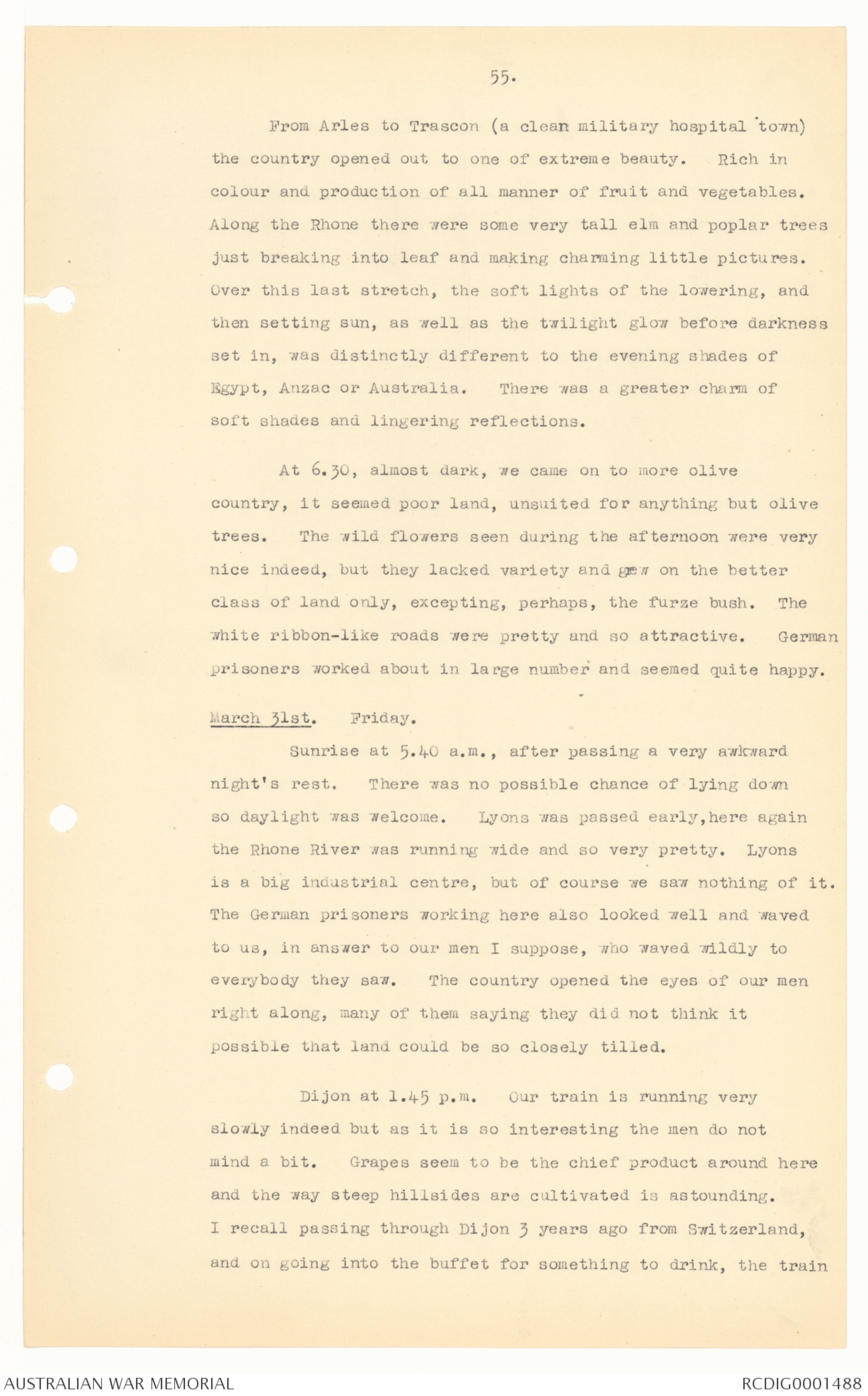
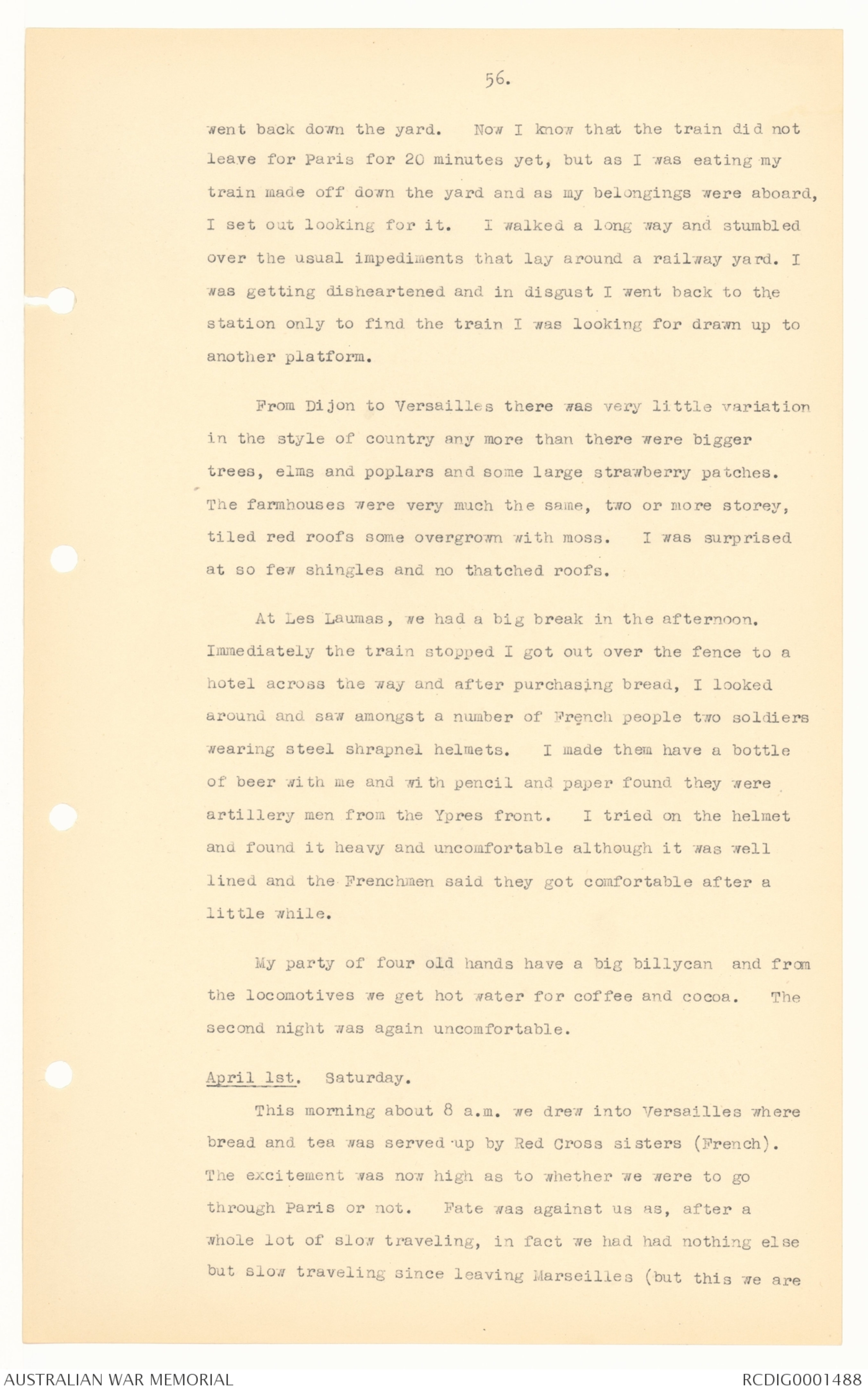
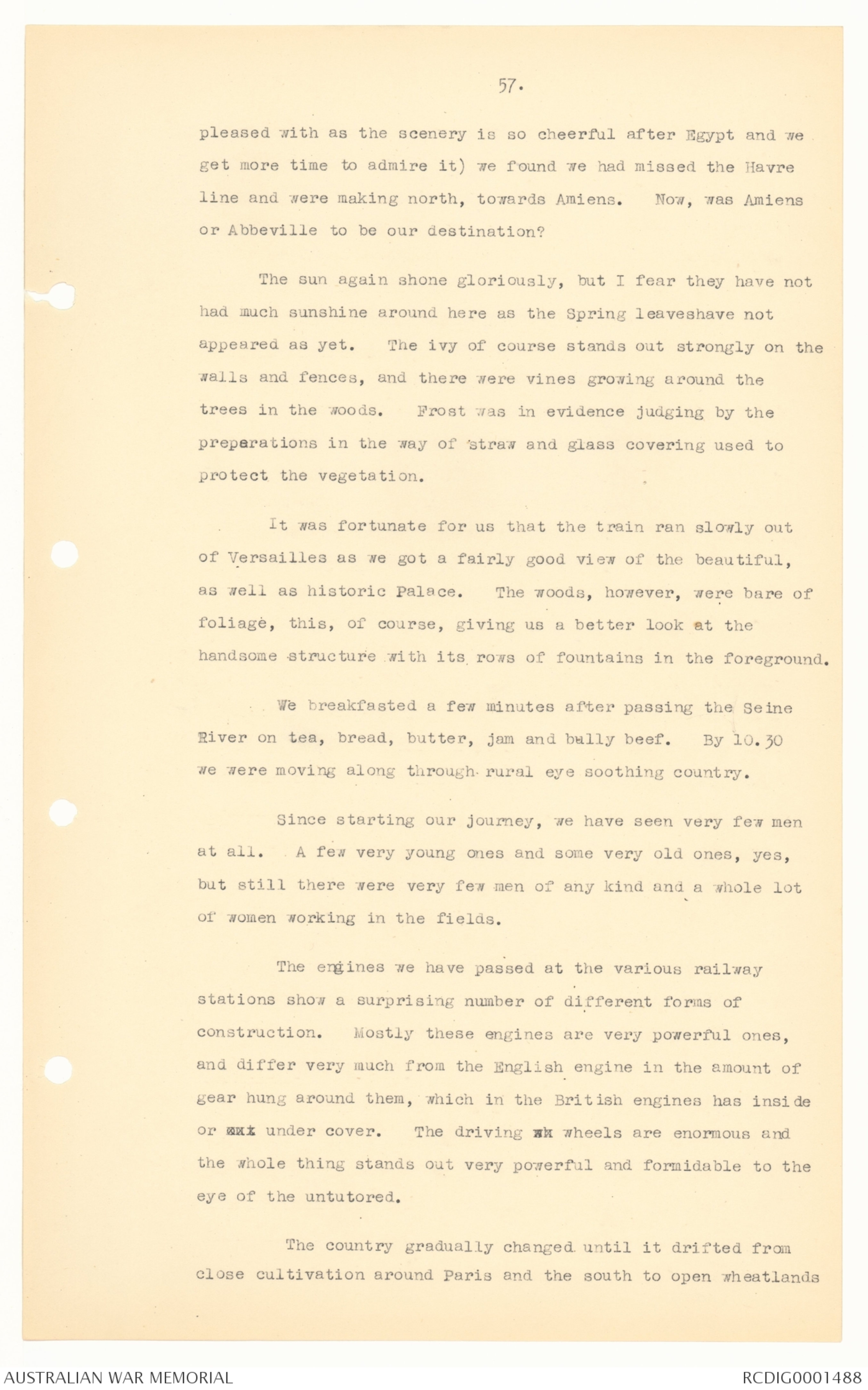
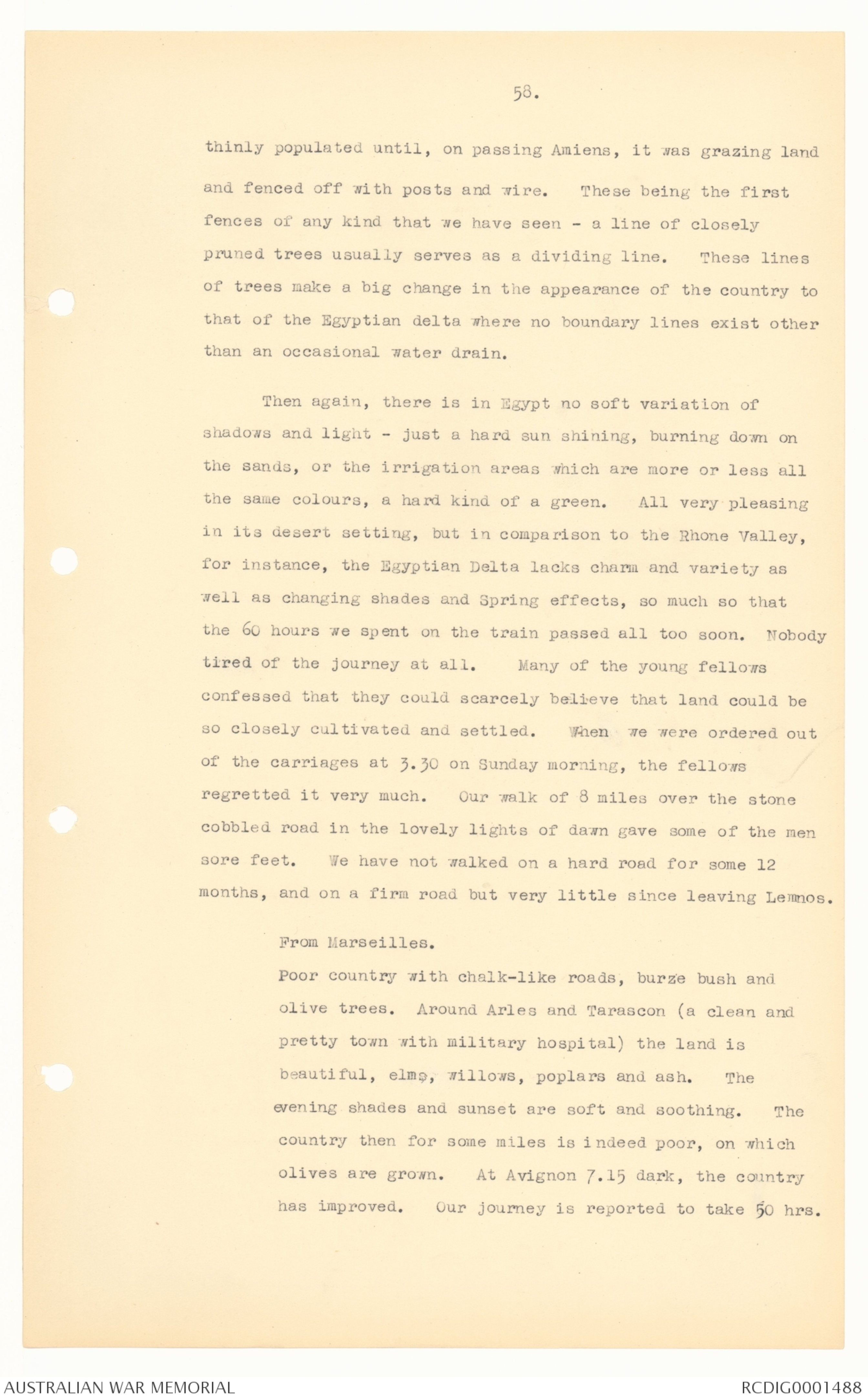
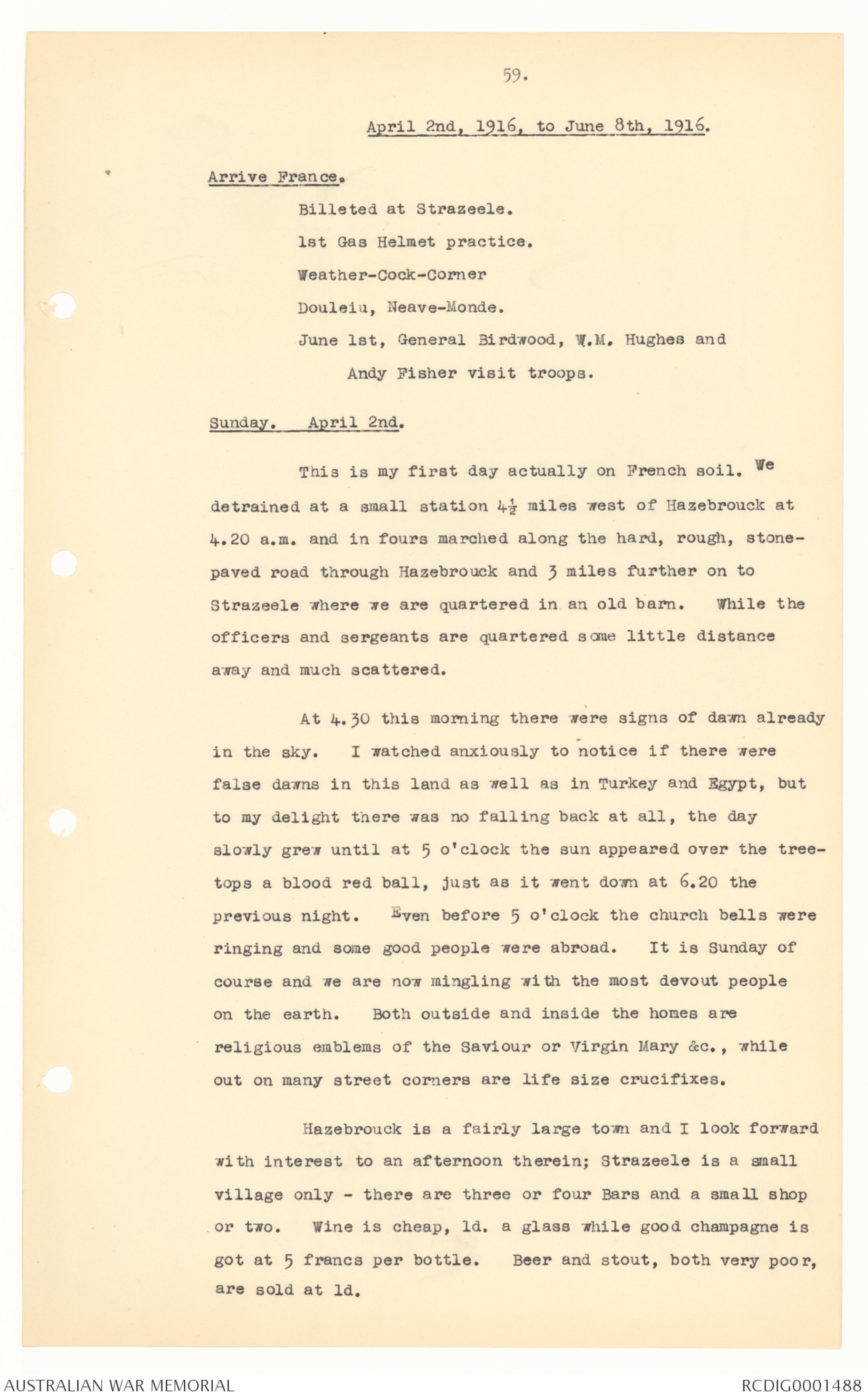
50.
to be a glorious experience for me here in Europe. Many
times I have longed to see what a Springtime was really
like. The Autumn I know well and thrill with enthusiasm
when my thoughts run over the charming English autumn.
Submarine stories are plentiful enough aboard with
the scary frightened fellows, but the lights careless way
in which the ship's crew pass over all thoughts of danger from
torpedos is good enough for me to feel secure and not to even
think of submarines.
I handed out the jam today. It is done up in 7 lb.
tins and as a man is allowed only 1½ ozs. a day, and messes
vary from 10 to 22 men which makes 112 messes all told, you
can see it is difficult work to get down to 21 tins. I
used up 23 today and still fellows growl and say nasty
things about the small quantity they get.
This afternoon my little party had to undergo
inoculation again and as most of the men have suffered
severely from same, we are expecting a whole lot of trouble
tomorrow.
We have been passing along the coast of Sardinia all
day and should arrive in Marseilles or Toulon wherever we are
going, some time tomorrow.
March 29th. Wednesday.
Today is a rather dull day and I have held back my
washing to hang out. My bad luck, I suppose. I wanted
some pictures also of the Lewis machineguns which are mounted
around the ship. Then again yesterday's inoculation made
me very "dopey" and I am easily the best man, or should I
say, the least sufferer of our party of 8 men. Even the
worst by far of my momentary troubles is the creepy, horrid
feeling that comes over one after finding a couple of lice
on one's clothing, as I did on turning up the sleeves of my
cardigan this morning - the woollen jacket goes to the deep
you can bet your socks on that.
51.
I have been following my maps closely to locate the
different towns mentioned as being the likely place for
which we are now destined. First Rouen, then Amiens and
now Abbeville. As these three places are close together
right up in the North Western corner of France, I fancy
that we are in for a very long ride in the train at any rate
and that we must pass right through Paris in transit. If
they don't jam us into those dark enclosed carriages, the
journey will be fine. The open timber waggons with only
a few inches of side (like Egyptians carriages) would do us
splendidly and travel as much as possible in the daytime.
I am sure that if our men could get a real good look at the
land en route with its almost continuous villages and
closely cultivated fields, it would do them a whole lot of
good, and probably bring home to them more plainly than
anything else possibly could the fact that people brought
up in such a closely settled and thickly gardened country
must necessarily be a different class of people in their
manners and grooves of thought than we Australians are.
The Australian is an awfully arrogant individual, this naturally
follows with his isolation from the rest of the world.
When I say "arrogant" I mean it in the light of judgment as
will be, and is passed, upon us by people who are not in
themselves conversant with Australia and the peculiarities
under which we are brought up. Yet to be considered
impudent and small minded by the folk we come into contact
with is bad and we Australians should change our ways to
meet the ideas of those people we find ourselves thrown
amongst. And there is no better way than to first study
the country in which the people are born and brought up. Our
men have heard such stories of Paris high life, commonly
called French life, that they must think the Frenchmen live
only for wine and sensuality. This may apply to Paris,
but it certainly does not apply to France proper. So, as
our men are labouring, I feel sure, under the impression
that morality is unknown in France and that a fellow is at
52.
liberty to accost any woman, invite her to wine and then
sleep with her. Therefore, I expect quite a lot of trouble
to come about with our men over here. Then, surely our men
cannot be altogether to blame, due to want of enlightenment.
The weakness of our education systems over and over again.
The British are the only people who have any honor, or high
morals, so we are always taught, but alas, this theory got a
severe shock and our men a sad awakening on their return
from England just recently. One man was so impressed by
the number of prostitutes he saw, and the amount of venereal
disease, that he concluded there was hardly a virtuous woman
in Great Britain and that 70% of British soldiers have the
pox. Soldiers returning from the trenches to their own
homes have been diseased by their own wives, who, during
the husbands' absence had to find money to meet the household
expenses, go on to the streets, and in many cases take their
daughters with them. I don't for a moment think this story
to be correct, but still it comes with a man finding out that
the British people, to whom we have been learned to look
up to, are no, or at any rate, little better than other
nations and most certainly not so clean, either in their
manner of living or in their morals as we Australians
ourselves actually are. When a man learns the truth for
himself, his early teachings get such a severe knock that
he is badly staggered and will I am delighted to think,
return to Australia a better Australian and a more useful
citizen.
All this morning we were out of sight of land, in
fact, there was not a ship to be seen, but then our vision
was obscured by rain squalls, when for practice our 4-7 gun
on the stern fired a shot at a box. This caused considerable
consternation amongst the unwary below deck, and some
amusing incidents happened. One officer was in the bathroom
at the stern of the ship when the gun fired, and,
thinking a torpedo had struck the vessel, raced in his
53.
undress along the passage way and took quite a lot of convincing
that nothing serious had really happened. A few moments after
the shot a French torpedo boat came racing alongside to enquire
what was wrong.
In the evening land loomed ahead, we seemed to then
follow the coastline, until harbour lights and search lights
flashed in all directions - here we anchored for the night.
The men aboard seemed very pleased tonight that the
voyage was ended. Rev. John Mackenzie's little after tea
service was attentively listened to. Mackenzie has done
wonders with the 4th Bn. I'm still of the opinion that he
is a big Salvation Army adventurer, yet I like him and nobody
dare say a word against him, even amongst the roughest of the
4th Bn. men.
The youngest and new men amongst us behaved as children
would on the eve of a holiday at bedtime. The older men take
matters just as they come, good or bad, nothing startles and
won't either until the coast of Australia confronts them.
Then.....
Marseilles arrived & leave.
March 30th. Thursday.
The weather is damp, though not raining - this morning
as we lay alongside No. 8 wharf. We weighed anchor at daylight
and entered the Harbour at once. Marseilles is almost
an artificial harbour, at the same time it is well protected
by a curve in the mainland and the islands of Monte Cristo.
The bluffs and highlands about seem very bare and desolate,
there is nothing pretty or attractive to be seen, even though
the history of the surroundings is exciting.
The one great satisfaction now is that a man can walk
about without having to take a life belt around with him.
Since leaving Alexandria nobody was allowed to move about
without a lifebelt. A good rule, no doubt, but an awful
54.
belly nuisance. This precaution has just been borne out too
by the news that the "Mineapolis" was torpedoed and sunk near
Malta within a few minutes of our passing them. I remember
seeing the "Mineapolis" myself, and can see that we had a very
narrow escape indeed. This news is officially given out this
morning, it must have been picked up at the time, but was held
back from us, and just as well too, as it would have caused
much fear amongst the men - land-bubbers that we Australians are.
The boat, 1550 aboard all told - drew up to the wharf about
7 a.m. At 1 o'clock all hands were ashore. A march of 1
mile brought us to the railway station where we were soon ushered
into 3rd class carriages, 8 to a compartment, and made off for
our still unknown destination. When marching to the station,
the 4th Bn. leading then the A.M.C. and Engineers, the
Frenchmen stood interestedly bit unmoved along the route; they
were for the most part a very poor looking people, ill clad and
slovenly particularly the womenfolk, of course this is an
inferior quarter of even an inferior town like Marseilles. One
woman of excellent appearance stood on the roadside watching
the march pass when she seemed suddenly moved and, taking a
bunch of pansies from her belt, walked unhesitatingly across
holding out the flowers towards myself. I stepped out of the
column, took the bouquet, saluted and picked up my place again,
while the lady was saying "Good luck Englishmen" and something
in French I could not follow. It was a very pretty little
incident and pleased me very much. Poor as she was, she came
forward so earnestly and with such a glorious expression of
sympathy and good wishes.
We reached the town of Arles by nightfall and saw the
splendid Rhone River. Up to Arles the scenery was very
interesting but of a somewhat poor quality, producing chiefly
olives, and early Spring flowers. The flowers are now done,
the Spring is in its brighter mood, and the blooms of the furze
bushes threw a golden shade over the patches of poor country.
55.
From Arles to Trascon (a clean military hospital town)
the country opened out to one of extreme beauty. Rich in
colour and production of all manner of fruit and vegetables.
Along the Rhone there were some very tall elm and poplar trees
just breaking into leaf and making charming little pictures.
Over this last stretch, the soft lights of the lowering, and
then setting sun, as well as the twilight glow before darkness
set in, was distinctly different to the evening shades of
Egypt, Anzac or Australia. There was a greater charm of
soft shades and lingering reflections.
At 6.30, almost dark, we came on to more olive
country, it seemed poor land, unsuited for anything but olive
trees. The wild flowers seen during the afternoon were very
nice indeed, but they lacked variety and grew on the better
class of land only, excepting, perhaps, the furze bush. The
white ribbon-like roads were pretty and so attractive. German
prisoners worked about in large number and seemed quite happy.
March 31st. Friday.
Sunrise at 5.40 a.m., after passing a very awkward
night's rest. There was no possible chance of lying down
so daylight was welcome. Lyons was passed early, here again
the Rhone River was running wide and so very pretty. Lyons
is a big industrial centre, but of course we saw nothing of it.
The German prisoners working here also looked well and waved
to us, in answer to our men I suppose, who waved wildly to
everybody they saw. The country opened the eyes of our men
right along, many of them saying they did not think it
possible that land could be so closely tilled.
Dijon at 1.45 p.m. Our train is running very
slowly indeed but as it is so interesting the men do not
mind a bit. Grapes seem to be the chief product around here
and the way steep hillsides are cultivated is astounding.
I recall passing through Dijon 3 years ago from Switzerland,
and on going into the buffet for something to drink, the train
56.
went back down the yard. Now I know that the train did not
leave for Paris for 20 minutes yet, but as I was eating my
train made off down the yard and as my belongings were aboard,
I set out looking for it. I walked a long way and stumbled
over the usual impediments that lay around a railway yard. I
was getting disheartened and in disgust I went back to the
station only to find the train I was looking for drawn up
to another platform.
From Dijon to Versailles there was very little variation
in the style of country any more than there were bigger
trees, elms and poplars and some large strawberry patches.
The farmhouses were very much the same, two or more storey,
tiled red roofs some overgrown with moss. I was surprised
at so few shingles and no thatched roofs.
As Les Laumas, we had a big break in the afternoon.
Immediately the train stopped I got out over the fence to a
hotel across the way and after purchasing bread, I looked
around and saw amongst a number of French people two solders
wearing steel shrapnel helmets. I made them have a bottle
of beer with me and with pencil and paper found they were
artillery men from the Ypres front. I tried on the helmet
and found it heavy and uncomfortable although it was well
lined and the Frenchmen said they got comfortable after a
little while.
My party of four old hands have a big billycan and from
the locomotives we get hot water for coffee and cocoa. The
second night was again uncomfortable.
April 1st. Saturday.
This morning about 8 a.m. we drew into Versailles where
bread and tea was served up by Red Cross sisters (French).
The excitement was now high as to whether we were to go
through Paris or not. Fate was against us as, after a
whole lot of slow traveling, in fact we had had nothing else
but slow traveling since leaving Marseilles (but this we are
57.
pleased with as the scenery is so cheerful after Egypt and we
get more time to admire it) we found we had missed the Havre
line and were making north, towards Amiens. Now, was Amiens
or Abbeville to be our destination?
The sun again shone gloriously, but I fear they have not
had much sunshine around here as the Spring leaves have not
appeared as yet. The ivy of course stands out strongly on the
walls and fences, and there were vines growing around the
trees in the woods. Frost was in evidence judging by the
preparations in the way of straw and glass covering used to
protect the vegetation.
It was fortunate for us that the train ran slowly out
of Versailles and we got a fairly good view of the beautiful,
as well as historic Palace. The woods, however, were bare of
foliage, this, of course, giving us a better look at the
handsome structure with its rows of fountains in the foreground.
We breakfasted a few minutes after passing the Seine
River on tea, bread, butter, jam and bully beef. By 10.30
we were moving along through rural eye soothing country.
Since starting our journey, we have seen very few men
at all. A few very young ones and some very old ones, yes,
but still there were very few men of any kind and a whole lot
of women working in the fields.
The engines we have passed at the various railway
stations show a surprising number of different forms of
construction. Mostly these engines are very powerful ones,
and differ very much from the English engine in the amount of
gear hung around them, which in the British engines has inside
or xxx under cover. The driving xx wheels were enormous and
the whole thing stands out very powerful and formidable to the
eye of the untutored.
The country gradually changed until it drifted from
close cultivation around Paris and the south to open wheatlands
58.
thinly populated until, on passing Amiens, it was grazing land
and fenced off with posts and wire. These being the first
fences of any kind that we have seen - a line of closely
pruned trees usually serves as a dividing line. These lines
of trees make a big change in the appearance of the country to
that of the Egyptian delta where no boundary lines exist other
than an occasional water drain.
Then again, there is in Egypt no soft variation of
shadows and light - just a hard sun shining, burning down on
the sands, or the irrigation areas which are more or less all
the same colours, a hard kind of a green. All very pleasing
in its desert setting, but in comparison to the Rhone Valley,
for instance, the Egyptian delta lacks charm and variety as
well as changing shades and Spring effects, so much so that
the 60 hours we spend on the train passed all too soon. Nobody
tired of the journey at all. Many of the young fellows
confessed that they could scarcely believe that land could be
so closely cultivated and settled. When we were ordered out
of the carriages at 3.30 on Sunday morning, the fellows
regretted it very much. Our walk of 8 miles over the stone
cobbled road in the lovely lights of dawn gave some of the men
sore feet. We have not walked on a hard road for some 12
months, and on a firm road but very little since leaving Lemnos.
From Marseilles.
Poor country with chalk-like roads, burze bush and
olive trees, Around Arles and Tarascon (a clean and
pretty town with military hospital) the land is
beautiful, elms, willows, poplars and ash. The
evening shades and sunset are soft and soothing. The
country then for some miles is indeed poor, on which
olives are grown. At Avignon 7.15 dark, the country
has improved. Our journey is reported to take 50 hrs.
59.
April 2nd, 1916, to June 8th, 1916.
Arrive France.
Billeted at Strazeele.
1st Gas Helmet practice.
Weather-Cock-Corner
Douleiu, Neave-Monde.
June 1st, General Birdwood, W.M. Hughes and
Andy Fisher visit troops.
Sunday. April 2nd.
This is my first day actually on French soil. We
detrained at a small station 4½ miles west of Hazebrouck at
4.20 a.m. and in fours marched along the hard, rough,
stone-paved
road through Hazebrouck and 3 miles further on to
Strazeele where we are quartered in an old barn. While the
officers and sergeants are quartered some little distance
away and much scattered.
At 4.30 this morning there were signs of dawn already
in the sky. I watched anxiously to notice if there were
false dawns in this land as well as in Turkey and Egypt, but
to my delight there was no falling back at all, the day
slowly grew until at 5 o'clock the sun appeared over the treetops
a blood red ball, just as it went down at 6.20 the
previous night. Even before 5 o'clock the church bells were
ringing and some good people were abroad. It is Sunday of
course and we are now mingling with the most devout people
on the earth. Both outside and inside the homes are
religious emblems of the Saviour or Virgin Mary &c., while
out on many street corners are life size crucifixes.
Hazelbrouck is a fairly large town and I look forward
with interest to an afternoon therein; Strazeele is a small
village only - there are three of four Bars and a small shop
or two. Wine is cheap, 1d. a glass while good champagne is
got at 5 francs per bottle. Beer and stout, both very poor,
are sold at 1d.
 Beverley Pagano
Beverley PaganoThis transcription item is now locked to you for editing. To release the lock either Save your changes or Cancel.
This lock will be automatically released after 60 minutes of inactivity.